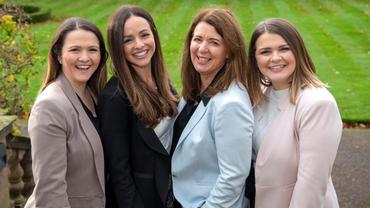Holly's helping hand | The 4 Things You Need To Know About Financial Planning and supporting your children
Expert tips
22 Aug, 2022
1. As parents, we've always been keen to support them as best we can without giving them lots of handouts. You want them to stand on their own two feet. So, you know, my son at the moment who's the only one at home, he's saving for a house. So you know, we encourage him to open a LISA and we encourage him to save as much as he can and to write down his budgeting, you know where he's spending his money. I feel that's something that we're doing for them without actually giving them you know, handouts to you know, they're getting into the habit of saving.
So I think the early part of their 20s was all about teaching them how to budget teaching them how to save, you know what their goals and objectives were.
2. My daughter went off to university then came home, got a job. And at that point, I thought, right I need to sit down with her and explain that we do need some sort of contribution to the household, all the food, the bills, everything else that she needs to pay a part of that. So she was kind of a bit horrified when I sat down with her and said that we wanted to make a contribution, you know, to the household because I think she saw us as both working parents and not particularly having to struggle and things like that. So it's like, well, you know, why do I need to pay for this you and dad are okay. And, you know, explained so she so I think her wording to me was something along the lines of so you want me to pay to live in our family house to have a look of horror, horrified, horrified on our face. So it was at that point that I kind of thought actually I really should have introduced this concept at a lot younger age. You know, maybe in their teens that when they get a job that you know, maybe they will be paying towards the housekeeping. Anyway, I think what it came down to she managed to negotiate with me that if she saved the money to buy a house that she should have paid in housekeeping, then you know, maybe that would be okay and we sort of struck by an arrangement on that basis.
3. Your40s are about getting through the sort of child care, building a business, you know, maybe setting the foundations. 50s seem to be more about consolidating it thinking about you know, what do I need to take me through the next 30 or 40 years of you know, my life How much do I need to be putting a pension that might be some catch up years when I didn't work for four years while my youngest after my youngest was born. So I think you know, people are probably women have got those catch up years to maybe think about where they were working or time or making smaller pension contributions that that you know, they can do the catching up in their 50s.
I would say definitely focus you know, in your 50s on you and your financial position before you focus on the children's make sure that you know that you're going to be alright and that plans are in place because I think as mothers we tend to put children first. And you know, these are the years that that maybe you can make a difference in you know, making some pension contributions or building some savings or having a new career.
4. I think you know, the, the first step to that is getting the state pension forecast and having a look at the the foundation to any retirement plan is the state pension. So to start with that, have a look at that. See what missing years obey you automatically get credits for children that are under 12 years of age. You've got credits for the first two years of life. So for everyone, that's a credit from 16 to 18, but then working out where the credits are, after that, and then you know, you do need to get some guidance about whether you should make that type of contribution now, or whether you should wait to near a state pension age because of course, if you got you're going to work there's no point in making the contribution if that's going to come in from national insurance that you pay while you work. But a good starting point would be to find out if there are missing years and how many years that you would need to catch up.


